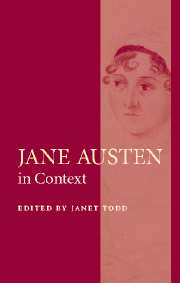16 - Agriculture
Published online by Cambridge University Press: 19 December 2020
Summary
To the historian's eye a conspicuous feature of film and television versions of Austen's novels is the almost complete absence of farmers and farm workers. We might think this absence derives from a ‘Heritage’ view of the past in which the millions whose labour supported the great houses of the land are passed over in silence, but the absence is also evident in Austen's novels, only the relatively minor character of Robert Martin in Emma serving to represent the most numerous social orders in a period when even the King was affectionately known as ‘Farmer George’ and espoused the merits of the farming life, and when most parish priests were, in the words of Sir William Scott to the House of Commons in 1802, ‘ex officio a farmer’. In the nine letters of Jane Austen's parents which still survive, farming is a constant concern. In one we find Mrs Austen saying that George Austen ‘wants to shew his brother his lands and his cattle’ and rejoicing in her own involvement in dairying: ‘I have a nice dairy fitted up, and am now worth a bull and six cows.’2 In another we detect the tone of someone very much in charge of this aspect of domestic business: ‘What luck we shall have with those sort of cows I can't say. My little Alderney one turns out tolerably well and makes more butter than we use, and I have just bought another of the same sort, but as her calf is but just gone, can not say what she will be good for yet’ (AP, 26 August 1770). And in a letter written in the year of Jane Austen's birth, the impression of a farming family is very clear:
The wheat promises to be very good this year, but we have had a sad wet time for getting it in, however, we got the last load in yesterday, just four weeks after we began reaping. I am afraid the weather is not likely to mend for it rains very much to-day, and we want dry weather for our peas and oats; I don't hear of any barley ripe yet, so am afraid it will be very late before harvest is over.
- Type
- Chapter
- Information
- Jane Austen in Context , pp. 185 - 193Publisher: Cambridge University PressPrint publication year: 2005
- 1
- Cited by



